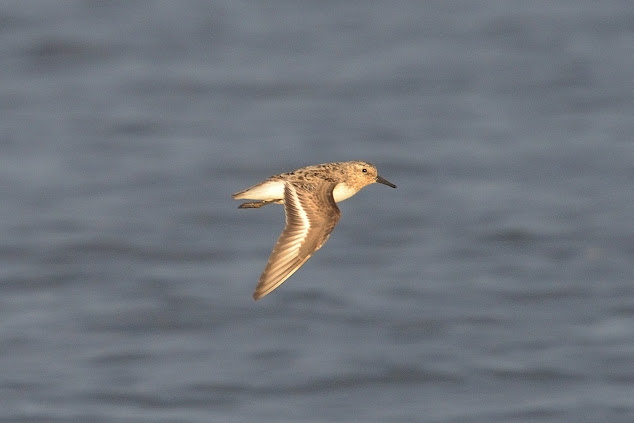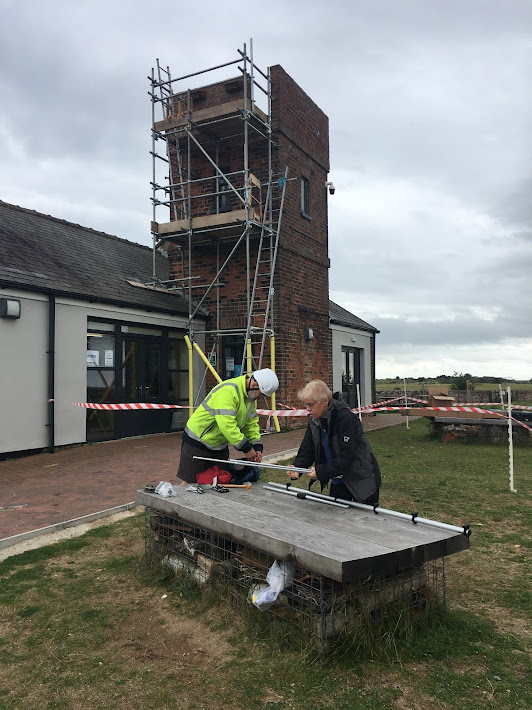August 20th. Moderate south-westerly wind. After some comparatively low Knot counts for the time of year, there has been a more recent arrival matching expectations. This mornings roost involved 75,000 birds. A good selection of birds offshore included 20 Arctic Skuas, a Bonxie south and a Long-tailed Skua. On the lagoons; a Great White Egret, 2 Curlew Sandpiper and a Little Stint were amongst various shanks, sandpipers, and good numbers of Black-tailed Godwit and Avocet. 2 Wheatear were on Rock ridge.
A morning ringing session in East Dunes produced 3 new birds: 2 Willow Warbler and a Sedge Warbler; and 2 retraps: a Robin and a Whitethroat.
August 19th. Rain until early morning, then increasing south-westerly wind.
A good passage over the sea involving Sandwich Tern, Common Tern, Kittiwake, Gannet, Arctic Skua, Waders and Ducks - with some 15 Shoveler, 6 Wigeon and 4 Pintail amongst the Teal flocks moving south. Three large groups of Whimbrel totalled 123 birds. 9 Black Tern included a nice flock of 7 close in. Up to 12 Arctic Skuas were still hanging around the beach area, harassing the terns and giving some excellent close views. A Wood Sandpiper came in off the sea, A Curlew Sandpiper was with the Dunlin flock and 3 Crossbill arrived from the north. Just 2 Pied Flycatcher and a single Redstart seen in windy conditions.
August 18th. Slowly increasing easterly wind again.
Attention was again mainly focused on the sea where the highlight was a Cory's Shearwater that flew south between 0841 and 0843hrs. This bird had been seen at Chapel Point yesterday from where it flew north early this morning, then being tracked as far north as Sutton on Sea at 0738hrs, before heading back south, via Anderby at 0809hrs and Chapel again at 0813hrs. This is only the third record of Cory's Shearwater for the Reserve following singles in 2000 and 1012. A constant northerly passage of Sandwich and Common Tern was underway again with 7 Black Tern, Gannet, Kittiwake and 70 Arctic Skua also moving north, with a Long-tailed Skua, and a Bonxie south. A small arrival of new migrants was noted, including 5 Pied Flycatcher (2 trapped), 3 Redstart, a Wheatear and a Whinchat, but surprisingly few warblers. Other birds of note were 3 Marsh Harrier, including one heading south and a Grey Heron flying out to sea.
A wind-shortened morning ringing session in East Dunes, with Miriam Hall, resulted in 8 new birds: 2 Pied Flycatcher, 5 Whitethroat and a Linnet; and 2 retraps: a Dunnock and a Blue Tit.
 |
| Pied Flycatcher, ringed 18 August 2023. Photo - George Gregory |
August 17th. Slowly increasing easterly wind.
The highlight of a morning sea-watch was an adult Long-tailed Skua around the feeding flock for several minutes before moving north and possibly settling offshore. 8 Arctic Skua were around the beach and feeding flock, whilst another 57 Arctic Skua went north with a constant stream of hundreds of Common and Sandwich Tern and many other unidentified terns more distantly. A single Black Tern, a Little Gull and 5 Manx Shearwater were also seen offshore along with a distant and brief Shearwater sp that was probably a Sooty. Good numbers of Knot, Sanderling, Dunlin and Grey Plover came up to roost on the high tide. 22 Spoonbill were on Tennyson's Sands and a flock of 7 Grey Herons arrived from the north or north east in the evening and continued south. A Pied Flycatcher was near Mill Hill.
A morning ringing session in East Dunes, with Miriam Hall, provided 6 new birds: a Chiffchaff, a Willow Warbler, 2 Reed Warbler and 2 Whitethroat; and 3 retraps: a Whitethroat, a Blackcap and a Willow Warbler.
Migrant Hawker Dragonflies, Common and Ruddy darters are now widespr3ad, with Willow Emerald Damselflies being seen around the Wren Woodland.
August 16th. Very warm and bright with a light onshore breeze. Strong light made sea-watching difficult for the first period and the wind strength and direction didn't encourage much in the way of migration, with various seabirds blogging north and south and little overland movement. many of the Willow Warbler from yesterday's arrival had obviously moved on already. There were however, still good numbers of Sandwich and Common Tern offshore and on the beach and good numbers of feeding Hirundines around the Freshwater Marsh. A Redstart was new at Mill Pond Meadow with a Crossbill south overhead. A juvenile Stonechat in the East Dunes could have been from one of the locally breeding pairs and 2 House Sparrow were the first reported for a while. Otherwise 2 Tree Pipit were notable.
A morning ringing session in East Dunes, with Miriam Hall, produced 7 new birds: 3 Willow Warbler, a Wren, a Blackcap and 2 Lesser Whitethroat; and a retrap Whitethroat.
August 15th. Another strong arrival of Willow Warbler was apparent today with 207 counted including birds ringed, although the fact that 51 were ringed in one relatively small area of dune scrub on the west side, indicated that the throughput could have been considerably more. Other migrants included the first Garden Warbler of the autumn, 2 Whinchat, 4 Tree Pipit and a new Wheatear (additional to the beach bird). In addition to 2 of the Tree Pipit moving south were 14 Yellow Wagtail, with a further 9 grounded. Hundreds of Common and Sandwich Tern featured on the beach and offshore again today with up to 20 Arctic Skua blogging locally and another 49 moving south. Flocks of various waders were also moving south along with pulses of Hirundine movement which culminated in a roost of 400 Swallow late evening. On Tennyson's Sands were 27 Spoonbill.
The eleventh session of CES was done this morning. The 72 new birds were 51 Willow Warbler, 3 Chiffchaff, 3 Blackcap, a Lesser Whitethroat, 8 Whitethroat, a Robin, a Tree Pipit, 2 Swallow, a Great Tit and a Dunnock; and the 6 retraps were a Robin, 2 Dunnock, a Chiffchaff, a Blackcap and a Whitethroat.
August 14th. Rain until mid morning curtailed any field work but fortunately cleared in time to enable the important task of setting up the Motus station. See Motus details here: https://motus.org/
We are grateful for the funding to enable this project to go ahead from Sea-changers, Lincolnshire Bird Club and donations made in memory of Dick Lambert.
August 13th. Increasing south-westerly wind.
A very large southerly movement of Sandwich and Common Tern offshore this morning with Gannet, Kittiwake and Arctic Skua. Totals during a 3 hour watch were 6040 Sandwich tern (including 3140 offshore in one scan and 1200 on the beach) and 2173 Common Tern (including 407 on the beach roost). An additional 1295 'Commic terns' Were more distant. A flock of 16 Arctic Skuas were harassing Sandwich terns over the Haven, with a further 6 around the north beach and 10 moving south. Small flocks of waders and duck were also moving south along the shore, including 3 Wigeon. 60 Kittiwakes were in the beach roost with a further 60 south and there was a noticeable increase of Cormorants - 110. Small numbers of Swallow, Sand Martin and Swift were also moving south. Other birds around were at least 8 Spoonbill and a Wheatear.
A wind-shortened morning ringing session in East Dunes yielded just 2 new Willow Warbler; and a retrap Whitethroat.
A wind-shortened morning ringing session at Aylmer Avenue by Mike Polling yielded 15 new birds: 3 Wren, 5 Willow Warbler, 2 Chiffchaff, 2 Blackcap, a Reed Warbler, a Dunnock and a Blackbird; and 7 retraps: a Blackbird, 2 Goldfinch, a Dunnock, 2 Long-tailed Tit and a Chiffchaff.
August 12th. An excellent morning for weather and birding initially, with lots of Warbler activity in the tall Hawthorns around North Car Park, the West Dunes and around Mill Hill. However, activity became subdued as the wind strengthened significantly, hampering more extensive counts and there was a heavy rain shower mid afternoon. Offshore, numbers of Sandwich Tern, Common Tern and Gannet had increased again, with a good feeding flock offshore, attracting several Arctic Skua while over 1000 Sandwich Tern were settled on the River Haven and another 500 on the beach out from Mill Hill. Additional Terns and Gannet were moving south, with the first Black Tern of the autumn. There was a light movement of Swallow, with fewer Sand Martin, House Martin and Swift, a few Yellow and Alba Wagtail and a Marsh Harrier. The escaped Gyrfalcon paid the Reserve another visit, causing widespread panic amongst the Gulls and Terns and a Cattle Egret was found on Tennyson's Sands mid afternoon - then moving to the grazing marsh beyond, amongst the cattle.
A morning ringing session in East Dunes provided 7 new birds: 3 Willow Warbler, a Robin, a Reed Warbler and 2 Whitethroat; a retrap Great Tit; and a control Lesser Whitethroat.
Ringing Recovery: Blackbird, ringed GPBO 25 October 2022, found dead Karviankyla, Finland 10 June 2023.
August 11th. Increasing south-westerly wind.
The morning started with a feeding flock of 350 Swallows over the Plantation before moving off south and there followed another 350 moving south during the morning with 150 Sand Martin and a Hobby.
A wind-shortened morning ringing session in East Dunes, with Miriam Hall, produced 5 new birds: a Wren, 2 Willow Warbler, a Robin and a Reed Warbler; and 4 retraps: a Wren, 2 Robin and a Dunnock.
An evening watch over the shore produced a roost of over 800 Sandwich Tern and 6 Arctic Skua. Some brief bursts of intense Hirundine movement amounted to 350 Swallow and 80 Sand Martin with 30 Swift passing south. Gulls were coming in to roost from various directions, with at least 6000 Black-headed Gull and 1400 Herring Gull, with a juvenile Caspian Gull.








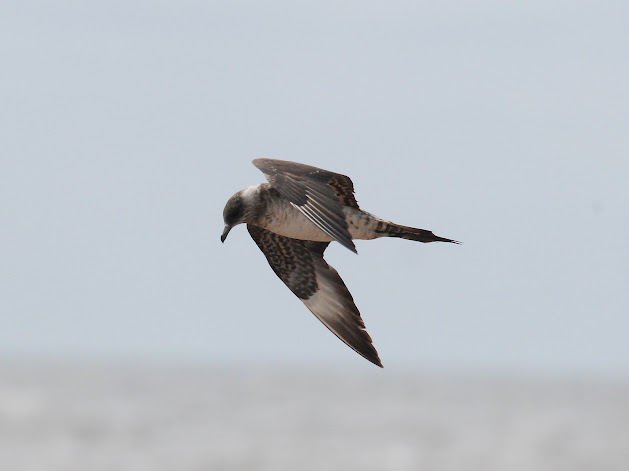







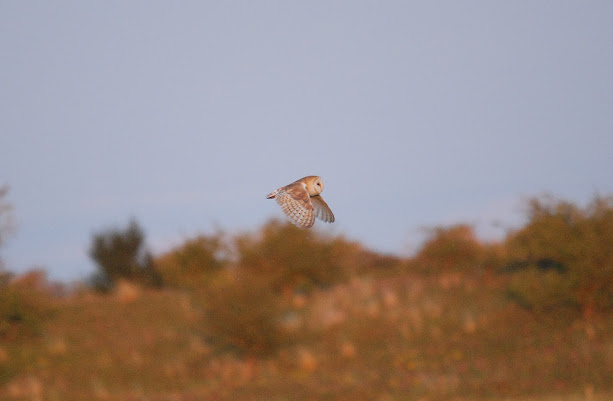
.jpeg)





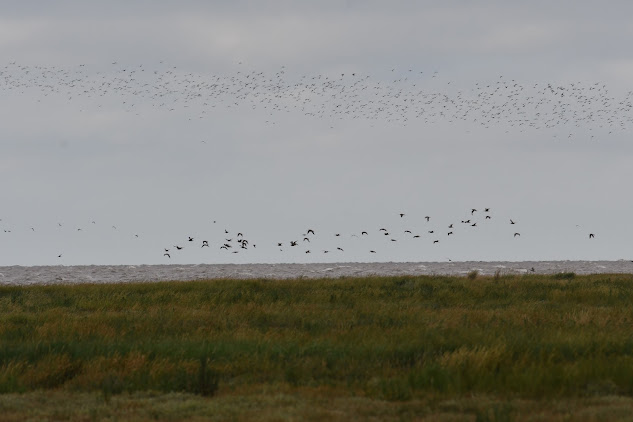



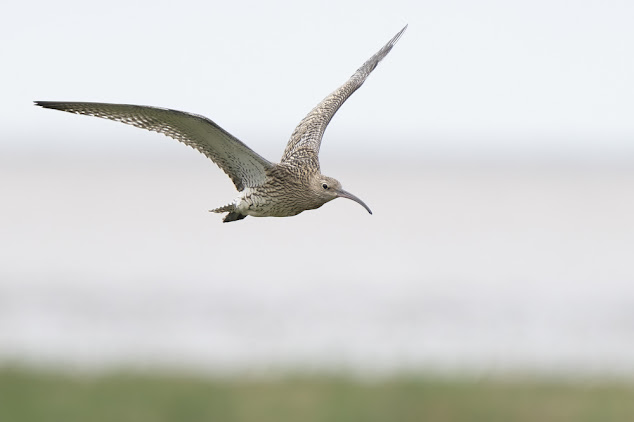


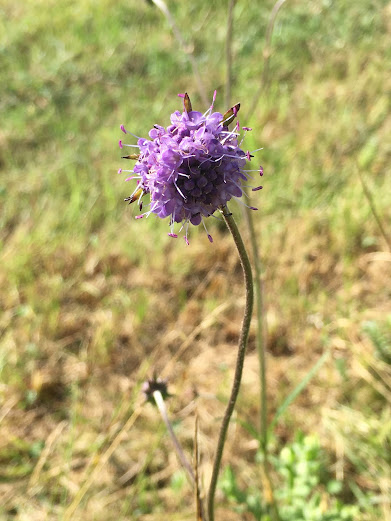




.JPG)

.jpeg)
.JPG)




